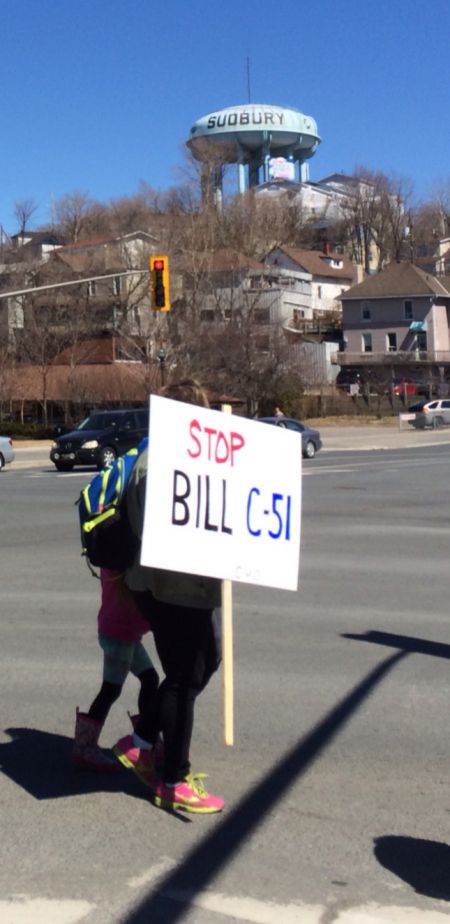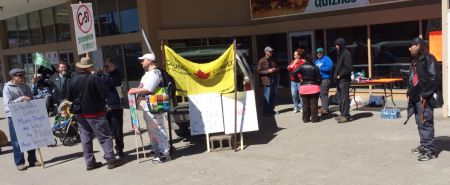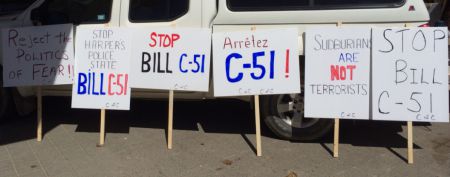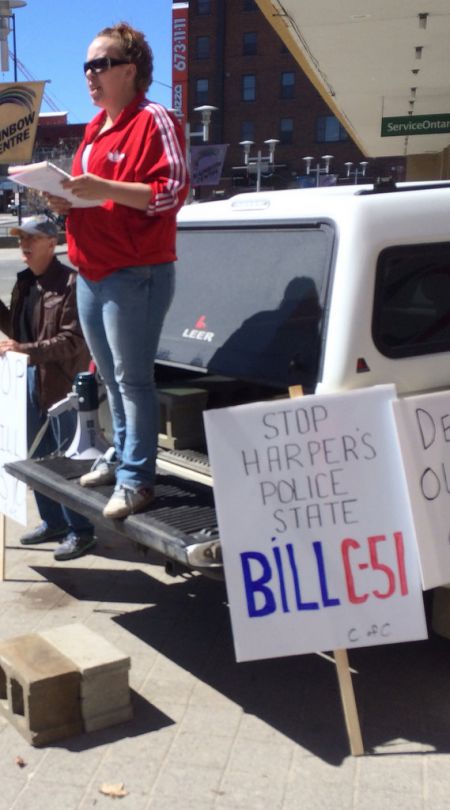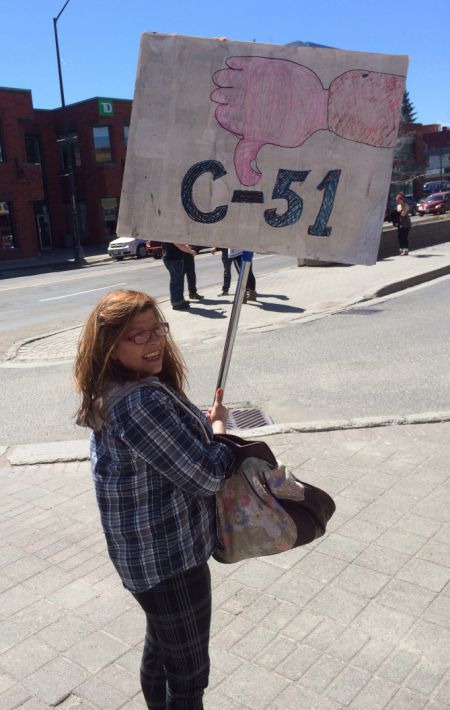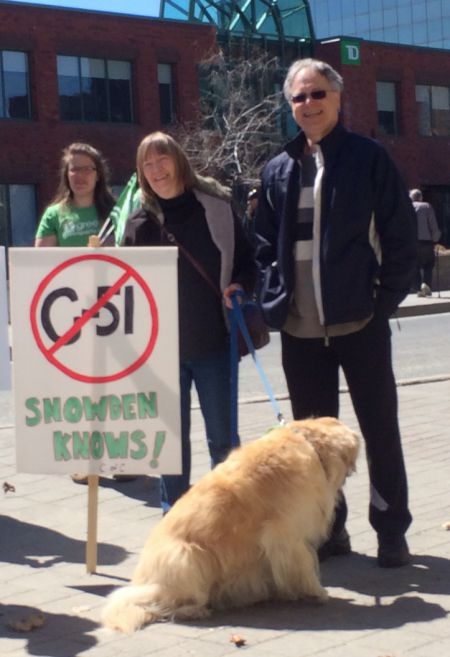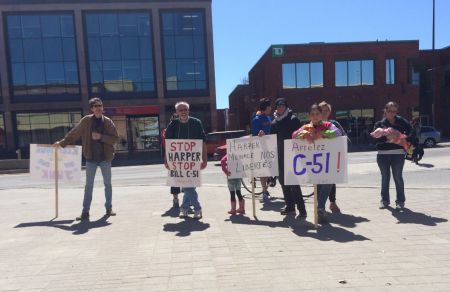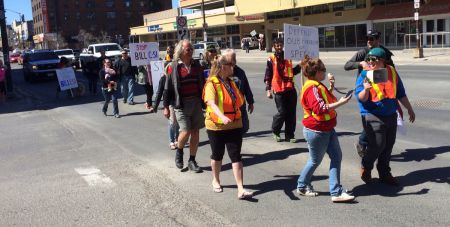Today, people in Sudbury and across the country took to the streets to demonstrate the growing public opposition to Bill C-51, controversial legislation pitched by the federal Conservatives as a response to terrorism.
"This is one seriously dangerous piece of legsilation," according to event organizer Angelle Provencher. She described Bill C-51 as a "secret police bill" that the "government is about to ram through," and fears that it "opens the door for violations of our Charter rights, including censorship and free expression online."
She noted that the legislation targets "environmentalists, ... Muslims, and many who are already subjected to questionable and overreaching powers by security officials. This bill will make it easier in law for government to continue infringing on the rights of peaceful people." She fears that the threats to the right to free expression contained in the bill will lead to "an era of keeping our mouths closed; no more activists."
Among other things, the legislation will give enhanced powers to the Canadian Security Intelligence Service (CSIS), Canada's main spy agency, including provisions that will allow it to do things that contravene the law and things that will "disrupt" groups that it targets; it will erode privacy rights and enhance the sharing of peoples' private information among federal institutions; it will give police new powers to detain people who have committed no crime; and it introduces a new criminal offence, "promotion of terrorism," that is defined such that many critics, including legal scholars, suggest that it will have a broad chilling effect on freedom of speech.
The Sudbury demonstration involved close to 50 people spending a sunny Saturday afternoon at a rally in front of the downtown's Rainbow Centre mall. About half that number stuck around for a police-escorted march through the downtown. The event was organized by an ad hoc group of local activists spearheaded by Provencher, within the framework of the national day of action. More established groups also had a presence, including the Council of Canadians, the Green Party, and the Marxist-Leninist Party.
There is clear evidence that opposition to Bill C-51 is growing. An Angus-Reid poll taken in February showed that 82% of Canadians supported the legislation at that time, while a Forum poll released earlier in April found that 56% of those aware of the legislation disapproved of it. Dr. Lorne Bozinoff, president and founder of Forum Research, concluded in that latter poll that "the more Canadians learn about Bill C-51, the less they like it." An extensive list of people and organizations have spoken out against the Bill, including the Assembly of First Nations; political commentators as ideologically diverse as Conrad Black and David Suzuki; former Prime Ministers and retired Supreme Court justices; various scholars, professionals, and professional associations connected with the law; unions and environmental groups; and many thousands of ordinary people. As well, though all of the opposition parties in Parliament have raised concerns about C-51, the Liberals are currently supporting it while the NDP and the Greens are opposed.
Sudburians took part in the action for a variety of reasons. Even though Christine Lortie has a new baby, she felt it was important for them both to be at the demonstration. "I'm standing up for my rights and my children's rights, for their future and their freedoms." She is most concerned with the "vagueness" of the bill, and that it would allow people to be arrested "pretty much just on suspicion, rather than hard facts. ... It's not innocent until proven guilty any more; you're guilty because we suspect."
Referring to Minister of Public Safety and Emergency Preparedness Steven Blaney, rally participant Pierrette Gagnon said, "If he's 'public security', why isn't he looking after the security of our water? Why is he ... looking at a very minute problem [like terrorism], making it look so exorbitant, when it's a non-issue, really?"
Dale McNabb sees Bill C-51 as "similar to the PATRIOT Act after 9/11 south of the border," referring to legislation championed by the administration of US President George W. Bush and passed by Congress in the wake of the terrorist attacks on September 11, 2001. He sees C-51 as "just clamping down on people's freedoms, giving the government more authority to act, when in reality I think we're more in danger from government and police than from the terrorists that they fearmonger about constantly."
Andre Clement of the Sudbury chapter of the Council of Canadians talked about the case of Maher Arar, a Canadian man who in 2002, with the active complicity of the Canadian government, was shipped by the US government to Syria, where he was held and tortured for over a year. (The Canadian government has since apologized and settled out of court with Arar.) He said of Arar's case, "This kind of thing is going to happen much more frequently" if Bill C-51 is passed. He said the Council of Canadians is also concerned that "the definitions of 'dissent' and 'terrorism' are being blurred. For example, what we are doing here today may be cause for an arrest and seizure with this bill being passed. So very terrible things could happen." Ideally, the Council would like to see the bill scrapped, but at the very least they are asking for more open hearings, stronger oversight measures, and a reduction in the new powers granted to security services.
Though both Provencher and Clement noted in passing that this new legislation would not be entirely novel but would build on existing national security infrastructure that in the past has, in part, targeted Muslims, this was a relatively minor focus of the rally. In other centres, organizers have done much more focus on the ways in which Bill C-51 is likely to have a disproportionate impact on indigenous people and people of colour. For example, Vancouver migrant justice organizer Daniel Tseghay has recently written, "Bill C-51 explicitly targets migrants. They are deemed threats to our security. The long-standing assumption that migrants are potentially bringing attitudes and customs projected onto the Global South into this country is being used to pre-emptively deny people’s legal rights, detain them, and deport them." And he insists that those organizing against Bill C-51 must recognize its "shared racist roots" with Canada's security certificate regime – which for many years has allowed indefinite detention without charge based on secret evidence, and has in recent decades mostly been used to target Muslim men of Arab and South Asian descent – and with other state practices targeting migrants.
Many of the speakers and participants exhorted people who are concerned about Bill C-51 to talk about it with their friends, family, and colleagues, and to express their dismay at the legislation to politicians. Dave Starbuck, a retired college teacher and representative of the Marxist-Leninist Party, suggested that while it is important to dissent in the face of this specific legislation, it also requires an orientation towards "long-term struggle" that is based on "ordinary people like the people here" getting together and working to "become the decision-makers" in their own lives, communities, and nations.
Rally participant Dale McNabb was blunter: "Eventually it's going to have to get around to grabbing the pitchforks."
Scott Neigh is a writer, activist, and media producer based in Sudbury, Ontario. He is the host of Talking Radical Radio, the author of two books of Canadian history told through the stories of activists, and a blogger.
